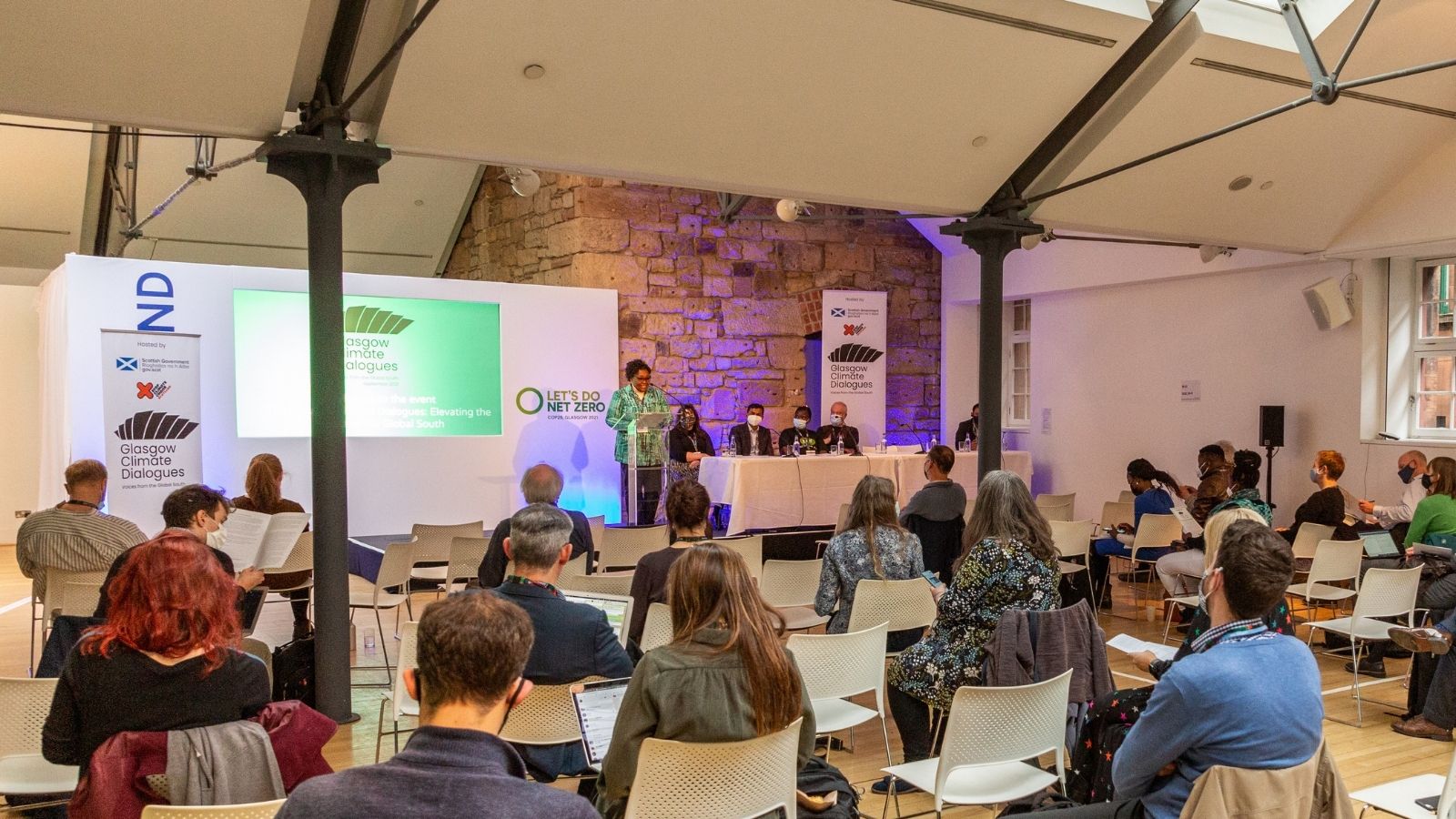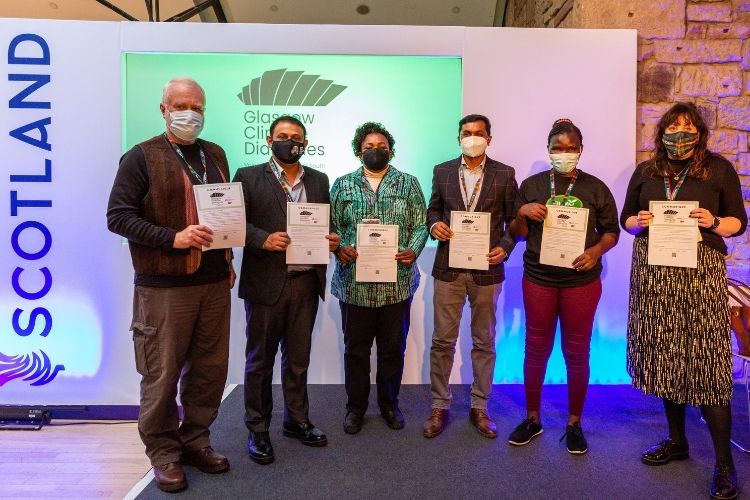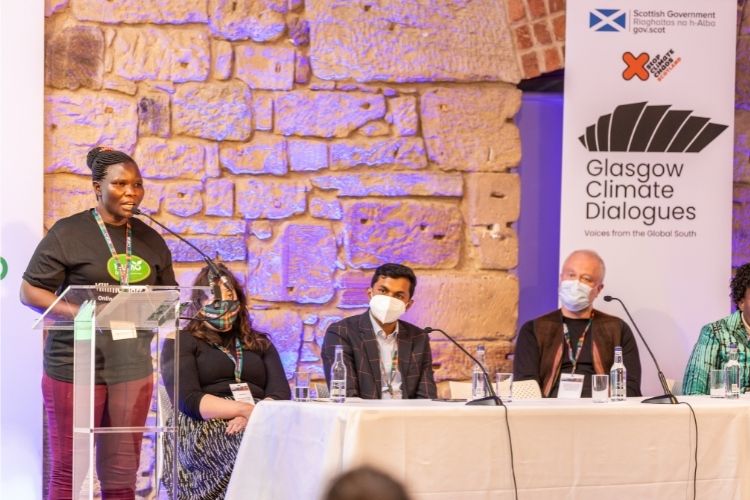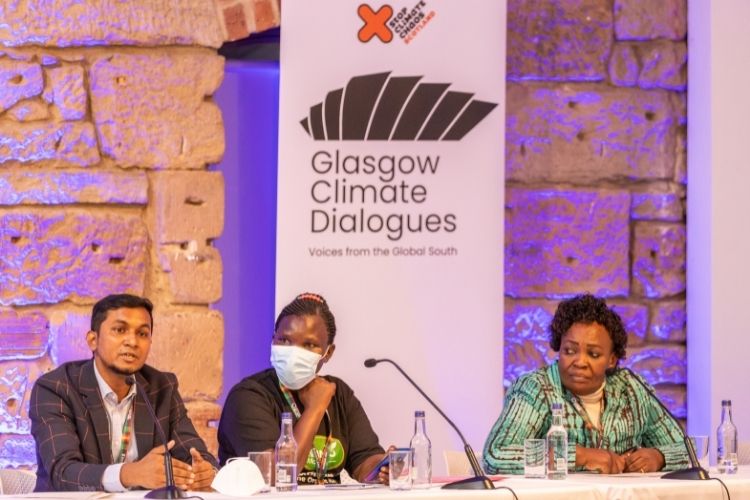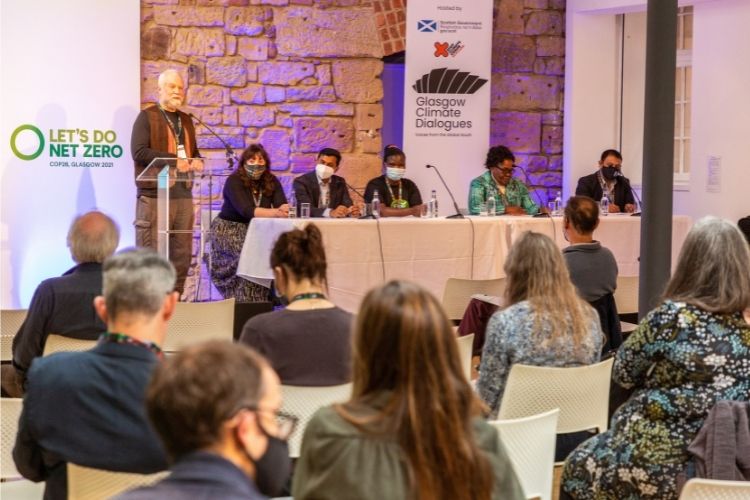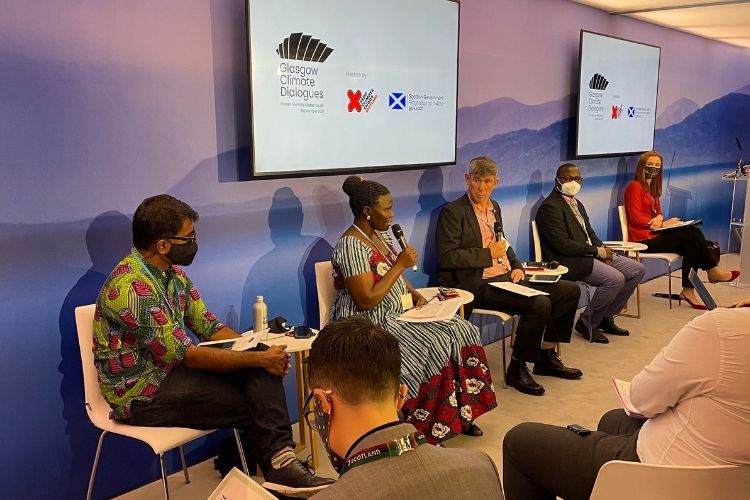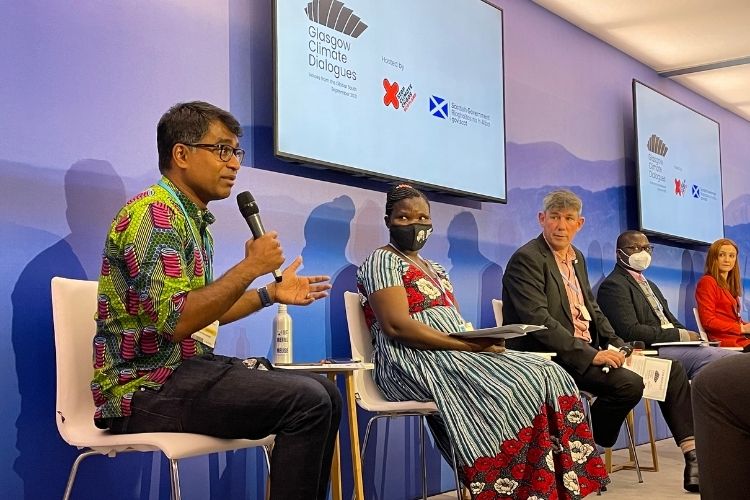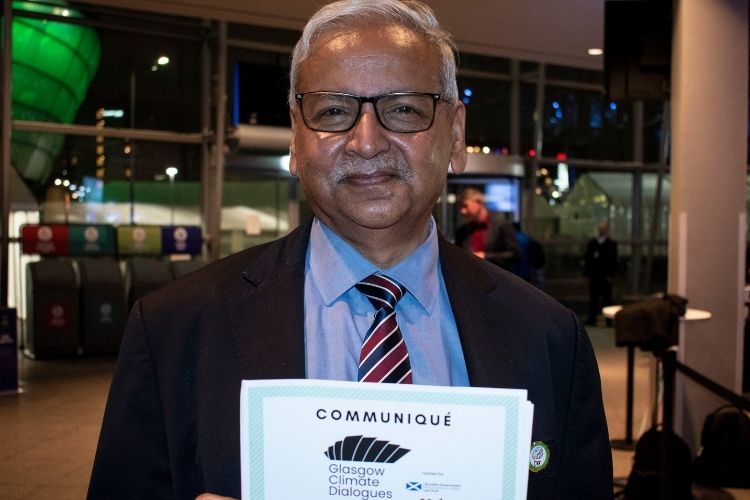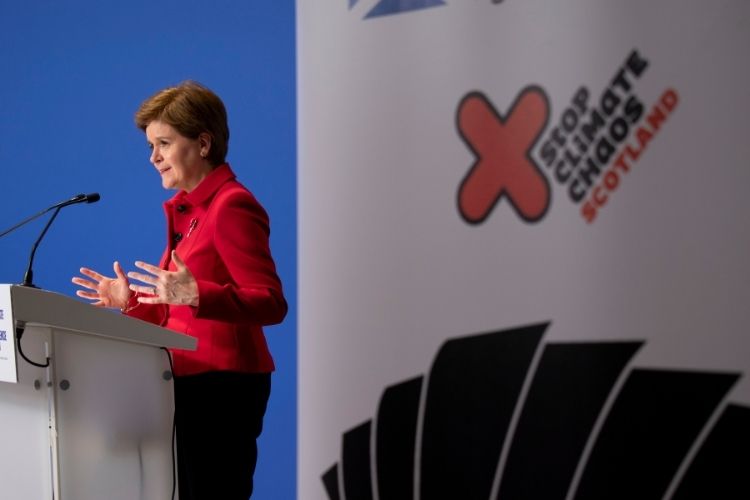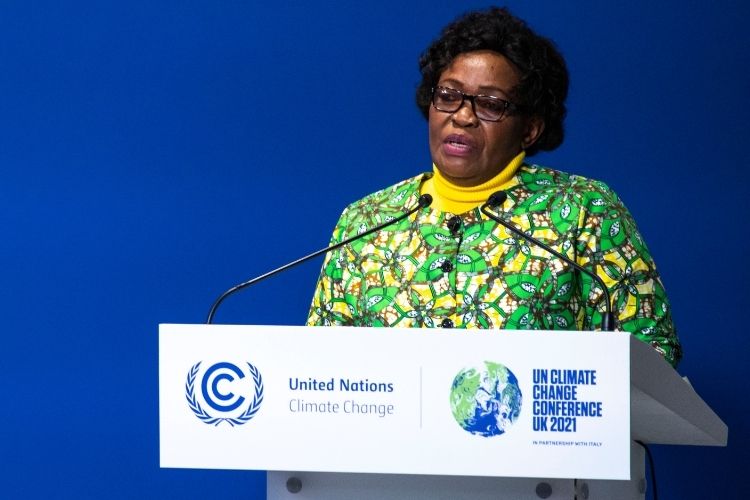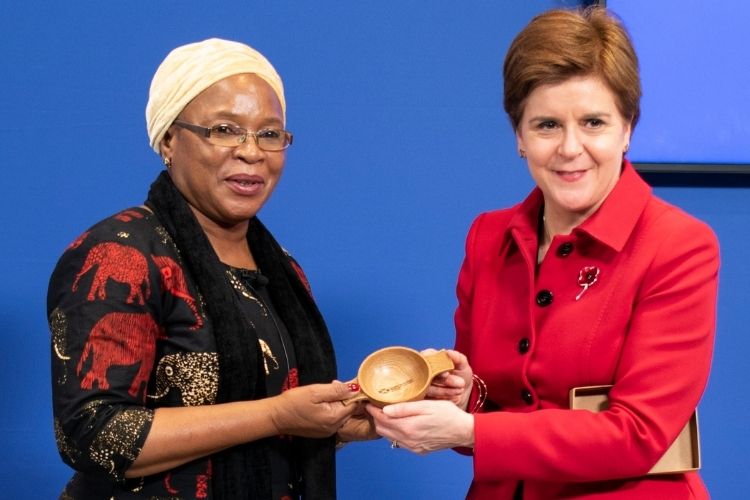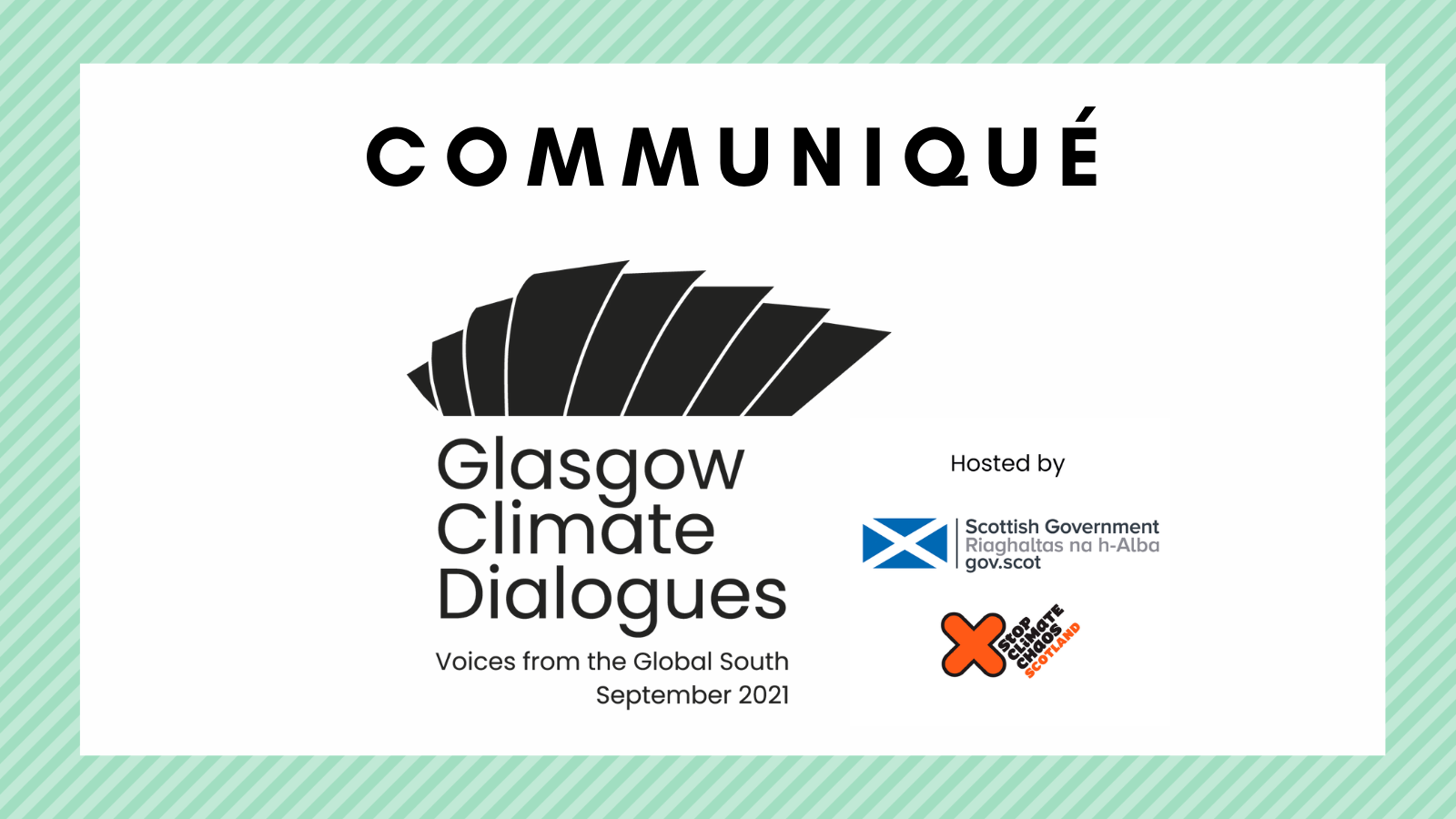Introduction to the Glasgow Climate Dialogues
The Glasgow Climate Dialogues were four online sessions, from 6-9 September 2021, designed to engage with, learn from and platform key Global South stakeholders on climate change ahead of COP26.
Each session was co-hosted by the Scottish Government and Scottish civil society and focused on a specific theme:
For an appraisal of COP26 outcomes in light of the expectations from the Glasgow Climate Dialogues, read this report.
Glasgow Climate Dialogues events during COP26
1 November
At a meeting on 1 November in the Scottish Government’s venue at The Lighthouse, representatives of those involved in the Dialogues from the Global South set out their expectations of COP26 and the ways in which Scotland can contribute to the global ambitions in the Paris Agreement.
The panellists were: Simon Anderson (SCCS), Bimal Regmi, Lucy Ssendi, Istiakh Ahmed, Margaret Masudio, and Tessa Ferry (Scottish Government).
Photos by Chris Hoskins.
2 November
On 2 November, at the UK Government Pavilion in the Blue Zone, we held a panel event alongside the Scottish Government to highlight the key findings from the Dialogues.
The panellists were: Dr Danny Sriskandarajah (Oxfam), Margaret Masudio, Alistair Dutton (SCIAF), Julius Ng’oma, Màiri McAllan (Scottish Government).
Photos by Fiona Hooker, SCCS.
8 November
On Monday 8 November, to disseminate the findings of the Glasgow Climate Dialogues, we hosted a Blue Zone side event alongside the Malawian Government.
The First Minister, Nicola Sturgeon, gave opening remarks and described Stop Climate Chaos Scotland as a “powerful” coalition.
Alistair Dutton, Chief Executive of SCIAF, chaired the event. The panel members included Hon. Nancy Tembo (Government of Malawi), Lucy Ssendi (Government of Tanzania), Professor Saleemul Huq (International Centre for Climate Change and Development).
Photos by James Cave, SCIAF.
Read the communiqué
A communiqué summarises the outputs of these Dialogues, and is intended to provide valuable inputs to COP26 negotiations on each of the four areas.
To read the communiqué, either click one of the below links to see the PDF version, or scroll down to read the communiqué here on this page.
Foreword from the Scottish Government
Climate change and nature loss are the greatest long-term threats facing our people and our planet and we’re already seeing the impact around the world. COP26 is a crucial milestone in the implementation of the Paris Agreement and an important opportunity to deliver lasting action towards a resilient Net Zero future that protects the most vulnerable, no matter where they live, adapts equitably to the changes to come and ensures no one is left behind.
To achieve that aim, in Glasgow we must all listen carefully, engage and build our understanding of the perspectives of those who experience the impacts of climate change first-hand and particularly of those countries and people facing the worst impacts and who have done the least to cause this climate emergency. Through our world-first Climate Justice Fund, the Scottish Government has shown our solidarity with those most impacted by climate change in the Global South and we will continue to champion their cause and support the amplification of their perspectives at COP26 in Glasgow.
That is why the Scottish Government, in collaboration with Scottish civil society, convened a series of virtual engagements where informed stakeholders from the Global South, along with Scottish and international organisations discussed expectations and key priorities for COP26 and beyond. This was named the Glasgow Climate Dialogues.
I am therefore delighted to share this short communiqué, detailing the recommendations of the Glasgow Climate Dialogues as one contribution to our joint responsibility to learn, to listen, and to engage on the issues that our colleagues from the Global South consider to be key to success at COP26.
Our aim is that the recommendations in each of these four critical areas, will serve to inform others and shape their discussions at COP26 and in doing so, support agreement at COP26 to the ambition, the inclusion and to the relevance of the global action that is so urgently required.
Màiri McAllan MSP
Minister for Environment and Land Reform
The Glasgow Climate Dialogues
The Glasgow Climate Dialogues were four online sessions co-hosted by the Scottish Government and Scottish civil society. Each session focused on a specific theme:
- Access, Participation and Voice: 6 September 2021
- Adaptation and Resilience: 7 September 2021
- Loss and Damage: 8 September 2021
- Just Transition: 9 September 2021
These four themes were developed in collaboration between Stop Climate Chaos Scotland (SCCS) and the Scottish Government. They were informed by understanding of Global South priorities ahead of COP26, and determined to be areas where there was clear opportunity for collaboration, dialogue and joint learning between Scottish actors and international partners.
The Glasgow Climate Dialogues were designed to engage with, learn from and platform key Global South stakeholders on climate change ahead of COP26. The Dialogues were hosted in recognition of the fact that the Global South is disproportionately affected by the adverse impacts of climate change and that to have a successful summit, it is essential to elevate and support representation of people from the Global South.
This communiqué summarises the outputs of these Dialogues, and is intended to provide valuable inputs to COP26 negotiations on each of the four areas. Information detailing the process followed and how these conclusions were reached is provided beneath.
The Glasgow Climate Dialogues were planned by a task force made up by representatives from civil society organisations in the Global South, members of SCCS and representatives of the Scottish Government’s COP26 team. Between May and August 2021 the task force met four times to make decisions on content and processes. Each of the four sessions were planned by two facilitators – one from the Global South and one from a Scottish civil society organisation – who collaborated on securing relevant speakers and making choices about key questions.
The Glasgow Climate Dialogues were attended by leading climate experts on each of the respective topics. Global South experts made up the majority of speakers and facilitators, with some Global North experts invited to dialogue with them during each session. For each session a list of invitees was compiled, and invitations were also circulated through a limited number of networks with an emphasis on securing Global South participation. The conclusions reached in this document are the product of these dialogues, though perspectives and suggestions from Global South participants were privileged in finalising the outputs.
The following process was followed to draw out the key messages and themes from the sessions, and for verification of conclusions:
Video recordings of the Dialogues, including plenary and breakout rooms, were reviewed and key themes and recommendations made were noted;
- Speaker presentation material, Chat Room content and Digital Board content was reviewed and used to sharpen messages;
- Entries submitted via post-event online forms circulated to those who registered for the Dialogue were reviewed to allow further messages to emerge;
- Event Reports with an overview of material and content, as well as key messages for the communiqué were drafted and circulated to speakers for initial feedback;
- Revised drafts of the Event Reports were shared with everyone who registered for the Dialogue for comments and feedback;
- Finalised Event Reports with key messages for the communiqué were submitted to the Glasgow Climate Dialogues task force for validation.
The reports are available at stopclimatechaos.scot/policy.
Key messages from the Glasgow Climate Dialogues
1. Access, Participation and Voice
1.1 The United Nations Framework Convention on Climate Change (UNFCCC) must learn from the impact of COVID on negotiations on Global South participation and create an action plan to address issues of access and participation. This action plan should aim to create a level playing field among Parties, and financial support to ensure Global South participation should be boosted. The UNFCCC should engage in broad consultation to develop this action plan, and ensure its implementation is funded by developed country parties.
1.2 Special efforts must be made to ensure access of young people to UNFCCC negotiations. New avenues should be explored to enhance youth participation, including the promotion of youth delegates in country delegations, and the UNFCCC should invest in additional schemes to enable this participation, especially from the Global South.
1.3 An assessment is required of how the groups most impacted by climate change are heard in the negotiations, including women and girls, the youth, civil society, people from small island developing states, people with disabilities, Indigenous peoples and communities on the frontlines of climate impacts. Steps must be taken to improve access through new technological solutions to enable direct input to negotiations and the COP decisions should reflect such inputs.
1.4 Every effort possible must be made by the COP26 Presidency and others to get delegations from all parties to COP26 – especially from the Global South. This effort must include enhancement in the rollout of vaccines, arrangements for hotel quarantine, adding capacity to visa processing, and ‒ as a fall back ‒ creation of global hubs to enable virtual access where travel is impossible.
Read the full report on Access, Participation and Voice >2. Adaptation
2.1 Developed countries must meet their US$100bn annual climate finance promise with the target of a 50:50 split between mitigation and adaptation finance achieved and funding provided as concessional grants, not loans. Recognising this is insufficient, COP26 should significantly increase climate finance and agree a stretching new global public finance goal for adaptation for post-2025. Improved accounting mechanisms are required to enhance scrutiny of the quantity and quality of climate finance with more funding committed via UNFCCC mandated channels and climate finance both new and additional to Official Development Assistance (ODA).
2.2 Significantly enhance access to climate finance for the Least Developed Countries and Small Island Developing States, including by simplifying application procedures and overcoming capacity barriers. Simultaneously, boost investment to increase preparedness, early warning, and early action to prevent extreme weather events leading to disasters, including anticipatory action and commitments to the Risk-informed Early Action Partnership.
2.3 The proportion of climate finance reaching local communities must be substantially increased with monitoring enhanced to assess progress. The Principles for Locally-led Adaptation should be formally endorsed by all Parties to the UNFCCC with action to ensure climate funds facilitate increased local allocation, including strengthening local structures, processes, and institutions. A new, progressively increasing global goal for climate finance reaching local-levels should be considered. Technology and knowledge must be shared with local communities, while ensuring that local knowledge is harnessed. The Global Stocktake should encourage devolved and participatory decision-making, especially in evaluating progress on adaptation.
2.4 Climate finance must be fully accessible and responsive to the needs and rights of women, children and young people, Indigenous peoples, people with disabilities, and other marginalised groups, with structural barriers removed. Reporting on gender-responsiveness must improve and more finance delivered via Enhanced Direct Access opportunities, particularly national and sub-national small grants facilities with women’s participation within steering committees.
2.5 Support systems – like rights to land, water and natural resources – must be fully protected and enhanced for the most marginalised climate vulnerable communities to ensure climate adaptation can achieve sustainable and equitable impacts at scale. The UNFCCC must synchronise with the UN Water Courses Convention, the UN Water Convention, the Sendai Framework for Disaster Risk Reduction and the Convention on Biological Diversity to ensure the necessary investments and rights are delivered through an inclusive decision-making process with natural sources of food – including fisheries and forests – managed in a participatory way. Landscape level adaptation must be scaled in a way that ensures safe and nutritious food is produced in a resilient way with effective consideration of transboundary ecosystems and waters. Agro-ecological solutions must be mainstreamed into agricultural development.
Read the full report on Adaptation >3. Loss and Damage
3.1 Loss and damage due to anthropogenic climate change is an unjust legacy for young people and next generations. Parties to the UNFCCC starting at COP26 should listen better to those who are experiencing loss and damage – particularly the young, women, the marginalised – to be able to find ways to address this climate reality. Ways to document and record these experiences should be reported and assessed as part of the Global Stocktake.
3.2 Acknowledgement of the shared global responsibility for loss and damage should be expressed through a solidarity fund that channels support (financial, moral, technical) to those who need it most. Scotland, as a world renowned champion of climate justice, should convene discussions starting at COP26 to better address loss and damage as a part of the reality of climate injustice.
3.3 Loss and damage should be formalised under the UNFCCC as a third pillar area of negotiation and decisions. The UNFCCC needs to move on from trying to understand the complexity of climate loss and damage to the necessity of addressing it. National mechanisms to address loss and damage need to be built and supported. Governments should build knowledge and capacity where it is needed and have the political will necessary to address this reality.
Read the full report on Loss and Damage >4. Just Transition
4.1 Recognising the different circumstances of Global North and South, a just transition to meet the Paris Agreement goals must be based on the UNFCCC principles of common but differentiated responsibilities and respective capabilities and the right to development, requiring countries do their fair share of emissions reductions and repay their climate debt, transforming economies away from the historical and ongoing plunder of Global South resources by the Global North.
4.2 Respecting planetary limits, a radical rethink of how the right to development in the Global South can be realised on a finite planet is required for a just transition, avoiding a replication of the inequality and destruction caused by the path to development taken by the Global North.
4.3 An intersectional approach, recognising class, gender and racial dimensions and addressing the different ways people in the Global South experience climate impacts, is essential to just transition, which must be underpinned by a value system of solidarity and cooperation, human rights and social dialogue, rejecting colonial approaches to environmental protection and centring the knowledge, experience, stewardship, solutions and needs of women, indigenous people, peasants and smallholder farmers.
4.4 Just transition must uphold and advance workers’ rights, ensuring that workers are involved in decisions that affect them, providing social protection for workers and households, ensuring health and safety standards, recognising and addressing both productive and reproductive work, expanding the conversation beyond organised workers, and centring the experience of women.
4.5 Changing the energy system and energy sources is core to the just transition, ending reliance on fossil fuels and addressing the energy access crisis in the Global South, as well as ownership issues and changing patterns of consumption; state participation and leadership is essential to achieve this; we cannot rely on the market-based approach which caused the crisis to solve it.
4.6 The provision of public finance free from conditionality for energy access and renewable energy is essential to delivering the just transition, taking a more equal approach to finance moving from aid to cooperation, ensuring that finance reaches women, Indigenous peoples, peasants and smallholder farmers who are already delivering solutions to the climate crisis on the ground.
Read the full report on Just Transition >More information about the Glasgow Climate Dialogues
The Access, Participation and Voice session on 6 September was facilitated by the Civil Society Network on Climate Change (CISONECC) (Malawi) and SCIAF (Scotland).
Panellists and facilitators included:
- Ben Wilson from the Scottish Catholic International Aid Fund (SCIAF), Scotland.
- Gerard Howe – Deputy Director, COP26 & International Climate Change at the Scottish Government.
- Julius Ng’oma of CISONECC, who leads many committees in Malawi and has supported the Government of Malawi delegation to the Conference of Parties (CoPs) every year since 2014.
- Stella Funsani Gama – Lead Negotiator, Gender and Climate Change, Least Developed Country Group. Stella is a specialist in forest resources and integrated land use management, with a focus on rural development, community forestry, alternative energy access, and participatory and gender responsive approaches.
- Augustine B Njamnshi – Chairperson, Technical and Political Affairs – PACJA. Augustine is a lawyer with 26 years of environmental and forest policy and governance advocacy in Cameroon and the Central African sub-region. He is involved with many groups and holds positions with the African Coalition for Sustainable Energy and Access, the Bio-resources Development and Conservation Cameroon, and the Pan African Climate Justice Alliance.
- Vositha Wijenayake – Slycan Trust / Southern Voices. Vositha is an international lawyer who works for a nonprofit think tank focusing on climate change, sustainable development, biodiversity and ecosystem conservation, and social justice. She has been a member of the Sri Lankan delegation to the UNFCCC negotiations since 2016, negotiating on issues related to compliance, climate change adaptation, loss and damage, response measures, action for climate empowerment and gender.
- Chalani Marasinghe is co-ordinator of the Global Youth Forum on Climate Change, which aims to enhance youth engagement in climate action through capacity-building and technical support provision. She works on thematic areas of climate change, youth, food systems, ethical and sustainable consumption, livelihood development, and climate-related policy processes, including the Nationally Determined Contributions.
- The session included a reflection from Amelia Ma’afu of Caritas Tonga.
The Adaptation session on 7 September was facilitated by Oxfam Bangladesh and Oxfam Scotland.
Panellists and facilitators included:
- Enamul Mazid Khan Siddique, Head of Climate Justice and Natural Resource Rights, Oxfam in Bangladesh.
- Jamie Livingstone, Head of Oxfam Scotland and Board member of Stop Climate Chaos Scotland.
- Lyndsay Walsh, Climate Policy Adviser, Oxfam GB.
- Alejandro Alemán Treminio, Climate Change Officer Centro Humboldt and coordinator of the Climate Action Network Latin America.
- Nafkote Dabi, Climate Change Policy Lead, Oxfam International.
- Bob Natifu, Acting Commissioner, Climate Change Department, Ministry of Water and Environment in Uganda
- Janine Felson, Ambassador of Belize and an advisor to the Alliance of Small Island States and the Caribbean Community on climate and ocean matters
- Adeline Siffert, Senior Advisor on Climate Adaptation & Early Action, British Red Cross
- Liane Schalatek, Associate Director, The Heinrich Böll Foundation
- Masudio Margaret Eberu, smallholder farmer from West Nile region, Northern Uganda, and Chairperson of the Eastern and Southern Africa Small Scale Farmers’ Forum in Uganda.
- Tamara Coger, Senior Associate, Climate Resilience Practice, World Resources Institute.
- Ainka Granderson, Senior Technical Officer, Manager: Climate Change and DRR Programme, Caribbean Natural Resources Institute.
- Jamie Williams, Senior Policy Adviser for Poverty Reduction, Islamic Relief Worldwide.
The Loss and Damage session on 8 September was facilitated by the International Centre for Climate Change and Development (ICCCAD) and the International Institute for Environment and Development (IIED).
Panellists and facilitators included:
- Nasrin Khondokar MP, Bangladesh.
- Prof Saleemul Huq is director of the International Centre for Climate Change and Development (ICCCAD). He is an expert in adaptation to climate change in the most vulnerable developing countries and has been a lead author of the third, fourth and fifth assessment reports of the Intergovernmental Panel on Climate Change (IPCC). He also advises the Least Developed Countries (LDC) group in the United Nations Framework Convention on Climate Change (UNFCCC).
- Sadie de Coste, Ineza Umuhoza Grace, Loss and Damage Youth Coalition, Loss and Damage Youth Coalition (ldyouth.org)
- David MacLennan, Climate Change Working Group, Outer Hebrides, New Climate Change Group in the Outer Hebrides (cne-siar.gov.uk)
- Anna Carthy, of the International Institute for Environment and Development (IIED), is a climate change researcher. She has a background in environmental change and management, with a research focus on equity in climate adaptation and resilience. She also has experience conducting research on social protection, anticipatory action, and intersectionality in the humanitarian sector.
- Ritu Bharadwaj, of the IIED, is a senior researcher in the climate governance and finance team. She is experienced in senior policy development, research and management experience in government, funding agencies and international NGOs. Ritu has worked extensively on social protection, climate resilience, forest and watershed management, resource conservation, livelihood and gender issues.
- Professor Lisa Vanhala is a Professor of Political Science from University College London. She is interested in the politics of climate change and the socio-legal study of human rights and equality issues. Her current project, the Politics and Governance of Climate Change Loss and Damage, explores attempts to govern the impacts of climate change we will not be able to adapt to at the global and national level.
- Istiakh Ahmed manages both ‘Loss and Damage’ and ‘Locally led Adaptation and Resilience’ programmes at the International Centre for Climate Change and Development (ICCCAD). His research interest areas are loss and damage, livelihood resilience, climate change adaptation, environmentally induced migration, social vulnerabilities due to environmental stressors.
- Simon Anderson is a Senior fellow, Strategy and Learning, at the International Institute for Environment and Development (iied.org). Simon is currently working on monitoring and evaluation for learning, gender equality and issues of sustainable development universality. His work includes ways to transform experiential learning of sustainable development into evidence for policy.
The Just Transition session on 9 September was facilitated by The African Regional Organisation of the International Trade Union Confederation (ITUC-Africa) and Friends of the Earth Scotland.
Panellists and facilitators included:
- Gerard Howe – Deputy Director, COP26 & International Climate Change at the Scottish Government.
- Harjeet Singh – CAN-I.
- Sivan Kartha – Climate Equity Reference Project & SEI.
- Lebo Mulaisi – Cosatu.
- Ruth Nyambura – African Eco-feminist Collective and HOME.

